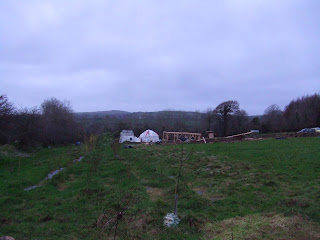This is a repost from "Ian's Eco Blog", all about my times exploring what a sustainable way of life might look like in the flesh. Back in 2009/2010, I heard of inspiring work going on at the Lammas Eco Village in Pembrokeshire, Wales and made several trips to help out there. This was in the very early days of the project, strictly for the intrepid...

I
spent most of my three weeks at Lammas helping Nigel and Cassie Leishman
in building their roundhouse. They had the upright wooden framework or
henge built (to left of picture above) and the start of the 18" low
circular wall which will carry the straw bales forming the rest of the
walls. Amazingly, they are living on site in a truck, a yurt and an army
tent with their three children during their building work. It was tough
going through the terrible November weather and they get huge respect
from me! Nigel is managing to grin and wave in the photo in spite of the
weather and all my terrible attempts at humour...

Everything
takes much more effort than when you're living in a nice little
suburban box. Water has to be carried in. Cooking, washing up and
chopping wood are done partly by torch light and then there are the
composting toilets....
you certainly don't hang around doing a crossword in these. Simon's is
mostly open to the North and only partly covered by a tarpaulin to the
South so it's quite an experience to use in wet and windy weather. The
door blew off Nigel's and is just propped up as strength permits. You
get used to them though, they are a great leveler and peel away yet
another layer of suburban middle class attitude.
We
just did as much as we could during the daylight, sheltering from the
worst of the rain and gales. At nights we fired up the stoves and got
warmed up again. I used to read stories to the younger two kids by
wind-up torchlight which was good fun - the kids seem to be quite happy
with their way of life, composting toilet and all. They squabble a bit
like any kids but I don't remember them ever moaning about the cold,
damp or mud - great kids!

Fellow
volunteer Ailsa and I helped Cassie build up the stone wall. My only
other experience of stone wall building was recently at Tombreck but I
really got into it and we developed a way of making a strong wall with
the rough stones laying around the site - "Use what you've got" - a good
motto. The spikes set in the wall will help to keep the bales in place.

One morning the weather didn't look too bad so Simon and the volunteers
helping him on his own house further up the hill all came down to help
us to put up the timbers for the reciprocating roof. (Nice bit of
cooperation and skill sharing on the go there.) These are really clever
structures - each pole is resting on its neighbour, there is very little
in the way of cutting or fitting to do and there is supposed to be very
little outward horizontal force directed into the structure. Two hours
had the first ten main beams up. They were big bits of wood to move
around though and I was glad to see them all bolted together eventually.


That's
me up on the roof fixing smaller branches from around the site on to
the main roof poles which will take the bales, pond liner and turf
forming the completed roof.































